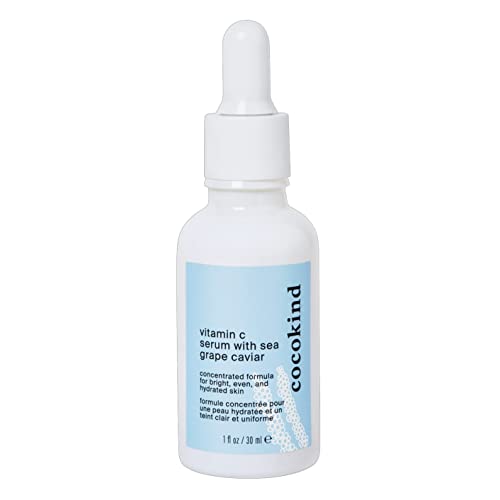
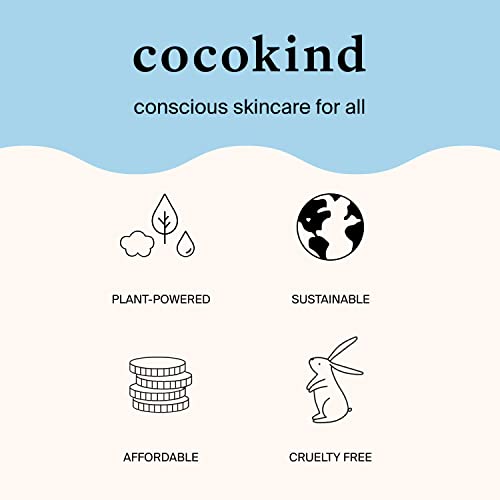
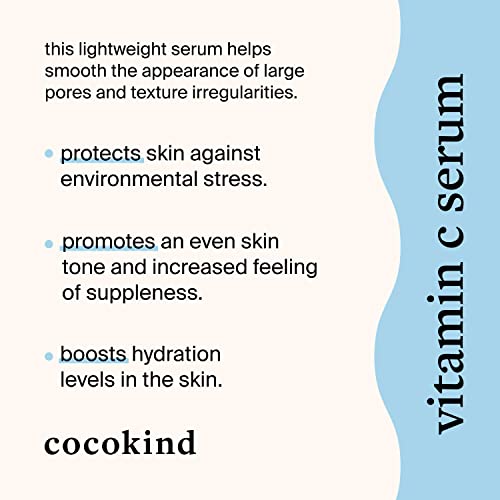
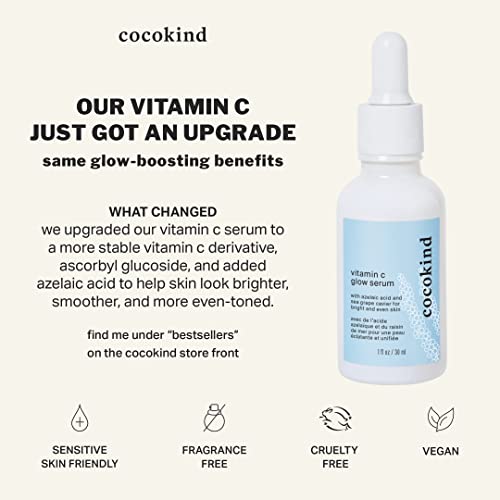
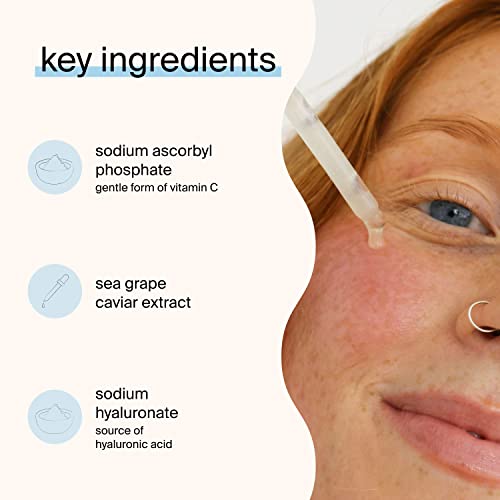
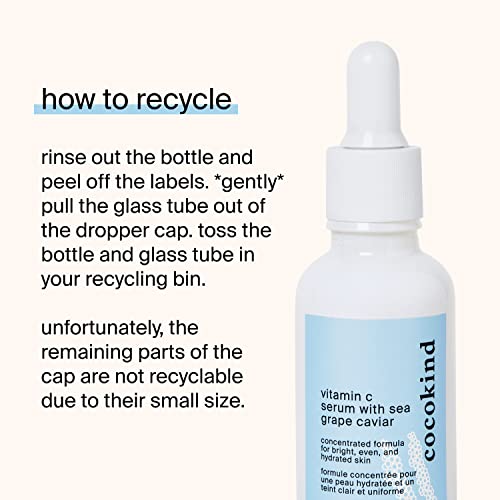
Cocokind Face Serum - Hydrating Vitamin C with Sea Grape Caviar, Brightens Skin Tone - 1 Fl Oz


Algae/Seaweed/Kelp Extract (Species Unspecified)
Medium RiskAlgae extract is an unspecified botanical extract derived from various algae species, commonly used in cosmetic and personal care products for its potential hydrating and nutrient-rich properties. It is valued for its ability to contribute to product formulation by offering texture enhancement and moisture retention.
Sustai Insights
Algae extract offers functional benefits such as hydration and nutrient delivery, which can enhance skin health. Its sustainability credentials may include being biodegradable and derived from renewable sources. However, potential health risks are low, with minimal concerns regarding carcinogenicity, allergens, or reproductive toxicity. Environmental risks primarily involve contamination, while regulatory warnings indicate that it should be sourced responsibly. Overall, the risk level is assessed as medium, suggesting careful usage and consideration of sourcing practices, with alternatives like plant-based extracts available.
Glycerin
Medium RiskGlycerin (also called glycerol) is a naturally occurring compound commonly used in personal care and cosmetic products. It functions as a humectant, attracting moisture to the skin, and is also utilized as a solvent and emollient to enhance product texture and stability.
Sustai Insights
Glycerin is valued for its effective moisturizing properties and biodegradability, making it a widely accepted ingredient in formulations. It poses low health risks, including low concerns for carcinogenicity and allergies. However, moderate use restrictions exist due to regulatory guidelines. While glycerin does not significantly contribute to environmental pollution, its production process should be ethically sourced. Overall, glycerin holds a medium risk level, emphasizing the importance of safe usage practices and considering sustainable alternatives.
Citric Acid
Medium RiskCitric acid is an alpha hydroxy acid used in personal care products primarily for its role as a pH adjuster and natural preservative. It occurs naturally in citrus fruits and is commonly utilized in various formulations for its chelating properties and mild exfoliation benefits.
Sustai Insights
Citric acid offers functional benefits as an effective preservative and pH stabilizer, contributing to product longevity and stability. It is biodegradable and derived from renewable sources. Health risks are low, with minimal concerns regarding carcinogenicity, allergies, and reproductive toxicity. However, moderate use restrictions exist due to potential irritation at high concentrations. Environmental risks are limited, as citric acid is not known to accumulate in ecosystems. Regulatory agencies have no significant advisories against its use. Overall, it is assessed as a medium-risk ingredient, with safe usage practices recommended and alternatives available.
Rosa Canina (Dog Rose) Fruit Extract
Low RiskRosa canina fruit extract is derived from the fruit of the dog rose plant. It is commonly used in cosmetic formulations due to its potential antioxidant properties and is often included for its hydrating and soothing effects on the skin.
Sustai Insights
Rosa canina fruit extract offers functional benefits such as hydration and antioxidant properties, promoting skin health. It is generally recognized as low risk concerning carcinogenicity, allergies, and reproductive toxicity. Environmental concerns are minimal as the extract is not associated with bioaccumulation or significant pollution. Regulatory bodies impose low restrictions on its use, making it a safe ingredient. Overall, it is assessed as low risk, with no significant health or environmental hazards, and alternatives are rarely necessary due to its favorable profile.
Leuconostoc/Radish Root Ferment Filtrate
Low RiskLeuconostoc/radish root ferment filtrate is a natural fermentation product derived from radish roots, commonly used in skincare for its potential preservative properties and skin-conditioning benefits. It functions by harnessing the metabolic activity of Leuconostoc bacteria to provide a source of beneficial compounds.
Sustai Insights
This ingredient offers functional benefits, primarily as a preservative and skin-conditioning agent, while being biodegradable and sustainably sourced. Health risks are generally low, with no significant concerns regarding carcinogenicity or allergies, though contamination concerns exist. Environmentally, it poses minimal risks, categorized as low overall risk based on current scientific consensus. Safe usage practices are advised, and alternatives may include other natural preservatives like tocopherol or rosemary extract.
Passiflora Incarnata (Maypops) Fruit Extract
Low RiskPassiflora incarnata (maypops) fruit extract is derived from the fruit of the passionflower plant. It is commonly utilized in cosmetic and personal care products for its potential soothing and moisturizing properties. This extract is known for its bioactive compounds, which may contribute to its efficacy in formulations.
Sustai Insights
Passiflora incarnata fruit extract offers functional benefits, including skin soothing and hydration. It is considered low risk for health concerns such as carcinogenicity, allergies, and developmental toxicity. Environmentally, it has a minimal pollutant potential and is not bioaccumulative. Regulatory assessments do not highlight significant warnings. Overall, the ingredient is deemed low risk, making it a suitable option in formulations with appropriate usage recommendations. Alternatives may include other botanical extracts with similar properties.
Sodium Dehydroacetate
Low RiskSodium dehydroacetate is an antimicrobial ingredient commonly used in cosmetic and personal care products to prevent microbial growth and extend shelf life. It is a sodium salt of dehydroacetic acid and is often included in formulations to enhance product stability and safety.
Sustai Insights
Sodium dehydroacetate serves as an effective preservative, contributing to product longevity without significant health risks, as it is associated with low concerns for carcinogenicity, allergies, and reproductive toxicity. Environmental risks are minimal, with no known bioaccumulation or significant pollution potential. Regulatory bodies allow its use, though some restrictions apply. Overall, it presents a low-risk profile. For safer alternatives, options like potassium sorbate may be considered.
Sodium Ascorbyl Phosphate
Low RiskSodium ascorbyl phosphate is a salt of ascorbic acid (vitamin C) commonly used in cosmetic formulations. It acts as an antioxidant and is often included for its ability to brighten skin and enhance the stability of products by preventing oxidation.
Sustai Insights
Sodium ascorbyl phosphate provides functional benefits as an antioxidant and skin-brightening agent, contributing to product efficacy. It is considered low risk regarding health impacts, with minimal concerns for carcinogenicity, allergies, or reproductive toxicity. Environmentally, it does not present significant hazards. Regulatory bodies do not impose severe restrictions, classifying it as safe for use. Overall, the risk level associated with this ingredient is low, making it a suitable choice in cosmetic formulations.
Sodium Hyaluronate
Low RiskSodium hyaluronate is the sodium salt of hyaluronic acid, a naturally occurring polysaccharide in the body. It functions primarily as a humectant in cosmetic formulations, retaining moisture and enhancing skin hydration, contributing to the overall texture and appearance of products.
Sustai Insights
Sodium hyaluronate offers several functional benefits, including effective moisture retention and skin hydration. It is considered safe with low concerns regarding carcinogenicity, allergies, or reproductive toxicity. Environmentally, it is not classified as a pollutant or bioaccumulative. Regulatory bodies do not impose significant restrictions on its use. Overall, it is assessed as low risk, making it a favorable ingredient in cosmetic formulations.
Tocopherol
Low RiskTocopherols are a class of naturally occurring compounds, primarily known for their role as antioxidants. They are commonly used in cosmetic and skincare products to help stabilize formulations and protect ingredients from oxidative damage.
Sustai Insights
Tocopherols provide functional benefits such as antioxidant protection and skin conditioning. They are generally recognized as safe, with low concerns regarding carcinogenicity, allergies, and reproductive toxicity. However, enhanced skin absorption and potential endocrine disruption are noted. Regulatory bodies have not imposed significant restrictions on tocopherols, categorizing the overall risk as low. Safe usage practices should be observed, and while alternatives exist, tocopherols remain a viable option in formulations.
Xanthan Gum
Low RiskXanthan gum is a polysaccharide, a sugar-based compound produced by the fermentation of glucose or sucrose. It is commonly used as a thickening agent and stabilizer in various food and cosmetic products due to its ability to improve texture and prevent ingredient separation.
Sustai Insights
Xanthan gum serves effectively as a thickener and stabilizer, enhancing product texture and consistency. It is biodegradable and typically derived from renewable sources, supporting sustainability efforts. Health risks are minimal, with low concerns regarding carcinogenicity, allergies, and reproductive toxicity. Environmental impact is similarly low, posing no significant hazards. Regulatory agencies, including the FDA, regard it as safe for use, with no significant restrictions. Overall, xanthan gum is assessed as low risk, making it a suitable ingredient in formulations.
Aloe Barbadensis (Aloe Vera) Leaf Juice
Low RiskAloe barbadensis (aloe vera) leaf juice is derived from the succulent aloe vera plant, known for its hydrating and soothing properties. It is commonly used in cosmetic formulations for its moisturizing effects and is often included in products aimed at skin care and healing.
Sustai Insights
Aloe vera leaf juice offers functional benefits as a moisturizer and skin soothing agent, while being sustainably sourced and biodegradable. Health risks are low, with minimal concerns regarding carcinogenicity, allergies, and reproductive toxicity. Environmental impact is also low, with no significant pollutants identified. Regulatory agencies impose few restrictions. Overall, the ingredient poses a low risk, making it a favorable choice in cosmetic formulations.
Rosa Canina (Dog Rose) Fruit Extract
Low RiskRosa canina fruit extract is derived from the fruit of the dog rose plant. It is commonly used in cosmetic formulations due to its potential antioxidant properties and is often included for its hydrating and soothing effects on the skin.
Sustai Insights
Rosa canina fruit extract offers functional benefits such as hydration and antioxidant properties, promoting skin health. It is generally recognized as low risk concerning carcinogenicity, allergies, and reproductive toxicity. Environmental concerns are minimal as the extract is not associated with bioaccumulation or significant pollution. Regulatory bodies impose low restrictions on its use, making it a safe ingredient. Overall, it is assessed as low risk, with no significant health or environmental hazards, and alternatives are rarely necessary due to its favorable profile.
Algae/Seaweed/Kelp Extract (Species Unspecified)
Medium RiskAlgae extract is an unspecified botanical extract derived from various algae species, commonly used in cosmetic and personal care products for its potential hydrating and nutrient-rich properties. It is valued for its ability to contribute to product formulation by offering texture enhancement and moisture retention.
Sustai Insights
Algae extract offers functional benefits such as hydration and nutrient delivery, which can enhance skin health. Its sustainability credentials may include being biodegradable and derived from renewable sources. However, potential health risks are low, with minimal concerns regarding carcinogenicity, allergens, or reproductive toxicity. Environmental risks primarily involve contamination, while regulatory warnings indicate that it should be sourced responsibly. Overall, the risk level is assessed as medium, suggesting careful usage and consideration of sourcing practices, with alternatives like plant-based extracts available.
Leuconostoc/Radish Root Ferment Filtrate
Low RiskLeuconostoc/radish root ferment filtrate is a natural fermentation product derived from radish roots, commonly used in skincare for its potential preservative properties and skin-conditioning benefits. It functions by harnessing the metabolic activity of Leuconostoc bacteria to provide a source of beneficial compounds.
Sustai Insights
This ingredient offers functional benefits, primarily as a preservative and skin-conditioning agent, while being biodegradable and sustainably sourced. Health risks are generally low, with no significant concerns regarding carcinogenicity or allergies, though contamination concerns exist. Environmentally, it poses minimal risks, categorized as low overall risk based on current scientific consensus. Safe usage practices are advised, and alternatives may include other natural preservatives like tocopherol or rosemary extract.
Passiflora Incarnata (Maypops) Fruit Extract
Low RiskPassiflora incarnata (maypops) fruit extract is derived from the fruit of the passionflower plant. It is commonly utilized in cosmetic and personal care products for its potential soothing and moisturizing properties. This extract is known for its bioactive compounds, which may contribute to its efficacy in formulations.
Sustai Insights
Passiflora incarnata fruit extract offers functional benefits, including skin soothing and hydration. It is considered low risk for health concerns such as carcinogenicity, allergies, and developmental toxicity. Environmentally, it has a minimal pollutant potential and is not bioaccumulative. Regulatory assessments do not highlight significant warnings. Overall, the ingredient is deemed low risk, making it a suitable option in formulations with appropriate usage recommendations. Alternatives may include other botanical extracts with similar properties.
Sodium Dehydroacetate
Low RiskSodium dehydroacetate is an antimicrobial ingredient commonly used in cosmetic and personal care products to prevent microbial growth and extend shelf life. It is a sodium salt of dehydroacetic acid and is often included in formulations to enhance product stability and safety.
Sustai Insights
Sodium dehydroacetate serves as an effective preservative, contributing to product longevity without significant health risks, as it is associated with low concerns for carcinogenicity, allergies, and reproductive toxicity. Environmental risks are minimal, with no known bioaccumulation or significant pollution potential. Regulatory bodies allow its use, though some restrictions apply. Overall, it presents a low-risk profile. For safer alternatives, options like potassium sorbate may be considered.
Sodium Ascorbyl Phosphate
Low RiskSodium ascorbyl phosphate is a salt of ascorbic acid (vitamin C) commonly used in cosmetic formulations. It acts as an antioxidant and is often included for its ability to brighten skin and enhance the stability of products by preventing oxidation.
Sustai Insights
Sodium ascorbyl phosphate provides functional benefits as an antioxidant and skin-brightening agent, contributing to product efficacy. It is considered low risk regarding health impacts, with minimal concerns for carcinogenicity, allergies, or reproductive toxicity. Environmentally, it does not present significant hazards. Regulatory bodies do not impose severe restrictions, classifying it as safe for use. Overall, the risk level associated with this ingredient is low, making it a suitable choice in cosmetic formulations.
Sodium Hyaluronate
Low RiskSodium hyaluronate is the sodium salt of hyaluronic acid, a naturally occurring polysaccharide in the body. It functions primarily as a humectant in cosmetic formulations, retaining moisture and enhancing skin hydration, contributing to the overall texture and appearance of products.
Sustai Insights
Sodium hyaluronate offers several functional benefits, including effective moisture retention and skin hydration. It is considered safe with low concerns regarding carcinogenicity, allergies, or reproductive toxicity. Environmentally, it is not classified as a pollutant or bioaccumulative. Regulatory bodies do not impose significant restrictions on its use. Overall, it is assessed as low risk, making it a favorable ingredient in cosmetic formulations.
Glycerin
Medium RiskGlycerin (also called glycerol) is a naturally occurring compound commonly used in personal care and cosmetic products. It functions as a humectant, attracting moisture to the skin, and is also utilized as a solvent and emollient to enhance product texture and stability.
Sustai Insights
Glycerin is valued for its effective moisturizing properties and biodegradability, making it a widely accepted ingredient in formulations. It poses low health risks, including low concerns for carcinogenicity and allergies. However, moderate use restrictions exist due to regulatory guidelines. While glycerin does not significantly contribute to environmental pollution, its production process should be ethically sourced. Overall, glycerin holds a medium risk level, emphasizing the importance of safe usage practices and considering sustainable alternatives.
Tocopherol
Low RiskTocopherols are a class of naturally occurring compounds, primarily known for their role as antioxidants. They are commonly used in cosmetic and skincare products to help stabilize formulations and protect ingredients from oxidative damage.
Sustai Insights
Tocopherols provide functional benefits such as antioxidant protection and skin conditioning. They are generally recognized as safe, with low concerns regarding carcinogenicity, allergies, and reproductive toxicity. However, enhanced skin absorption and potential endocrine disruption are noted. Regulatory bodies have not imposed significant restrictions on tocopherols, categorizing the overall risk as low. Safe usage practices should be observed, and while alternatives exist, tocopherols remain a viable option in formulations.
Citric Acid
Medium RiskCitric acid is an alpha hydroxy acid used in personal care products primarily for its role as a pH adjuster and natural preservative. It occurs naturally in citrus fruits and is commonly utilized in various formulations for its chelating properties and mild exfoliation benefits.
Sustai Insights
Citric acid offers functional benefits as an effective preservative and pH stabilizer, contributing to product longevity and stability. It is biodegradable and derived from renewable sources. Health risks are low, with minimal concerns regarding carcinogenicity, allergies, and reproductive toxicity. However, moderate use restrictions exist due to potential irritation at high concentrations. Environmental risks are limited, as citric acid is not known to accumulate in ecosystems. Regulatory agencies have no significant advisories against its use. Overall, it is assessed as a medium-risk ingredient, with safe usage practices recommended and alternatives available.
Xanthan Gum
Low RiskXanthan gum is a polysaccharide, a sugar-based compound produced by the fermentation of glucose or sucrose. It is commonly used as a thickening agent and stabilizer in various food and cosmetic products due to its ability to improve texture and prevent ingredient separation.
Sustai Insights
Xanthan gum serves effectively as a thickener and stabilizer, enhancing product texture and consistency. It is biodegradable and typically derived from renewable sources, supporting sustainability efforts. Health risks are minimal, with low concerns regarding carcinogenicity, allergies, and reproductive toxicity. Environmental impact is similarly low, posing no significant hazards. Regulatory agencies, including the FDA, regard it as safe for use, with no significant restrictions. Overall, xanthan gum is assessed as low risk, making it a suitable ingredient in formulations.
Aloe Barbadensis (Aloe Vera) Leaf Juice
Low RiskAloe barbadensis (aloe vera) leaf juice is derived from the succulent aloe vera plant, known for its hydrating and soothing properties. It is commonly used in cosmetic formulations for its moisturizing effects and is often included in products aimed at skin care and healing.
Sustai Insights
Aloe vera leaf juice offers functional benefits as a moisturizer and skin soothing agent, while being sustainably sourced and biodegradable. Health risks are low, with minimal concerns regarding carcinogenicity, allergies, and reproductive toxicity. Environmental impact is also low, with no significant pollutants identified. Regulatory agencies impose few restrictions. Overall, the ingredient poses a low risk, making it a favorable choice in cosmetic formulations.
Discover the transformative power of COCOKIND Vitamin C Serum with Sea Grape Caviar. This lightweight, vegan formula not only brightens the skin but also smooths texture and minimizes the appearance of large pores, making it an essential addition to your daily skincare routine.
- Boosts Hydration: Infused with Hyaluronic Acid, this serum enhances moisture retention, leaving skin plump and hydrated throughout the day.
- Gentle Anti-Aging: Utilizes sodium ascorbyl phosphate, one of the mildest forms of Vitamin C, to support natural collagen production and reduce signs of aging.
- Brightens Complexion: Effectively addresses dark spots and uneven skin tone, promoting a radiant and youthful appearance.
- Earth-Friendly Ingredients: Crafted with care, Cocokind's products are formulated using sustainable, plant-based ingredients that nourish the skin without harming the planet.
- Suitable for All Skin Types: This versatile serum is perfect for morning and evening use, easily integrating into any skincare regimen while being gentle on sensitive skin.
Subscribe & Save with Sustai
- Best Price Guarantee: Always enjoy the lowest prices on sustainable home essentials.
- No Surprises: We’ll notify you before shipping. No hidden fees, ever.
- You’re in Charge: Change, pause, or cancel your subscription anytime with ease.
- Eco-Friendly Deliveries: Our grouped shipments mean less packaging and lower emissions.
Join us on a sustainable journey. Special offers for a limited time! Prices and promotions may change.
Recommended Products
Discover the transformative power of COCOKIND Vitamin C Serum with Sea Grape Caviar. This lightweight, vegan formula not only brightens the skin but also smooths texture and minimizes the appearance of large pores, making it an essential addition to your daily skincare routine.
- Boosts Hydration: Infused with Hyaluronic Acid, this serum enhances moisture retention, leaving skin plump and hydrated throughout the day.
- Gentle Anti-Aging: Utilizes sodium ascorbyl phosphate, one of the mildest forms of Vitamin C, to support natural collagen production and reduce signs of aging.
- Brightens Complexion: Effectively addresses dark spots and uneven skin tone, promoting a radiant and youthful appearance.
- Earth-Friendly Ingredients: Crafted with care, Cocokind's products are formulated using sustainable, plant-based ingredients that nourish the skin without harming the planet.
- Suitable for All Skin Types: This versatile serum is perfect for morning and evening use, easily integrating into any skincare regimen while being gentle on sensitive skin.

You can have at most 2 Sustainable Steals products in your cart
Customer Reviews
Customers’ View
Customers appreciate the Cocokind Vitamin C Serum for its gentle yet effective formula, which enhances skin health and provides a youthful glow. Many users note that the serum clears up their skin, making it feel bouncy and hydrated, with several describing it as 'magic' for its quick results in lightening dark spots. The lightweight texture and pleasant scent further contribute to a positive user experience, with reviews highlighting the product's ability to leave a beautiful, dewy finish. Additionally, customers value the vegan formulation and the brand's commitment to sustainable practices. Overall, this serum aligns well with eco-friendly and health-conscious values, making it a trusted choice among users.
AI-generated from the text of customer reviewsThis product has no reviews yet.




